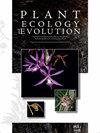不同温度和盐度条件下滨海白桦的萌发性评价及其保护意义
IF 1.1
4区 生物学
Q3 PLANT SCIENCES
引用次数: 0
摘要
背景和目的-微小Limonium是巴利阿里群岛东部(马略卡岛和米诺卡岛)的特有植物,生长在沿海岩石栖息地。为了制定该物种在该栖息地恢复的方案,评估了温度和盐度对微小利藻种子发芽的影响。材料和方法——在10至23°C的温度条件下进行了确定温度影响的实验。确定盐度影响的测试在18°C下进行了评估,浓度为0、100、200、300和400 mM的MgCl2、MgSO4、NaCl和Na2SO4。关键结果-最大发芽发生在16至20°C之间。根据盐度测试,用蒸馏水获得了最高的发芽值。盐水溶液的使用导致发芽率显著降低。然而,在几乎所有的处理中,都观察到种子发芽。T50在低温下随盐浓度的增加而增加。结论:微小利藻具有较宽的发芽温度范围和较高的耐盐性。在暴露于不同的盐水溶液后,一旦用蒸馏水洗涤,种子就会恢复其完全的发芽能力;因此,盐的作用对该物种具有渗透性和无毒性。在8月下旬播种可以确保该物种在沿海栖息地有最佳的生存机会。本文章由计算机程序翻译,如有差异,请以英文原文为准。
Assessing the germinability of coastal Limonium minutum (Plumbaginaceae) under different temperature and salinity conditions: implications for its conservation
Background and aims – Limonium minutum is an endemic plant of the eastern Balearic Islands (Majorca and Minorca), where it grows in coastal rocky habitats. The effects of temperature and salinity on seed germination of Limonium minutum were evaluated in order to set a protocol for recovery of this species in this habitat.Material and methods – Experiments to determine the effect of temperature have been carried out at temperature conditions between 10 and 23°C. Tests to determine the effect of salinity have been evaluated at 18°C with concentrations of 0, 100, 200, 300, and 400 mM of MgCl2, MgSO4, NaCl, and Na2SO4.Key results – Maximum germination took place between 16 and 20°C. Based on the salinity tests, the highest germination values were obtained with distilled water. The use of saline solutions resulted in significant decreases in the germination percentage. However, in almost all treatments, seed germination was observed. The T50 increased at low temperatures and with increasing salt concentration.Conclusion – Limonium minutum has a wide germination temperature range and a high resistance to salinity. After being exposed to different saline solutions, once washed with distilled water, the seeds recover their full germination capacity; therefore, the effect of salts is an osmotic and non-toxic effect for this species. Sowing seeds in late August ensures that the species has an optimal chance to survive in coastal habitats.
求助全文
通过发布文献求助,成功后即可免费获取论文全文。
去求助
来源期刊

Plant Ecology and Evolution
PLANT SCIENCES-
CiteScore
2.20
自引率
9.10%
发文量
27
审稿时长
>12 weeks
期刊介绍:
Plant Ecology and Evolution is an international peer-reviewed journal devoted to ecology, phylogenetics and systematics of all ‘plant’ groups in the traditional sense (including algae, cyanobacteria, fungi, myxomycetes), also covering related fields.
The journal is published by Meise Botanic Garden and the Royal Botanical Society of Belgium.
 求助内容:
求助内容: 应助结果提醒方式:
应助结果提醒方式:


